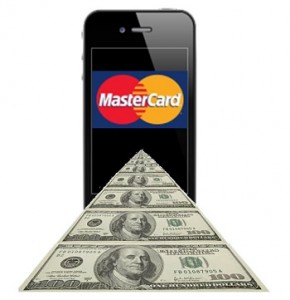While half of all American retail transactions are still completed in cash, smartphones may soon change that.
When it comes to retail purchases in-store in the United States, about 50 percent are still being completed with cash, but according to Ajay Banga, the CEO of MasterCard, mobile payments will start to change that, and it won’t be long before it happens.
Banga spoke of his opinion on mobile solutions at the Deutsche Bank Global Financial Services Investor Conference.
He explained that the area in which mobile payments will make the most striking impact is in the percentage of transactions that it will be taking from cash as opposed to plastic cards. He said that he feels that smartphone based transactions are the way ahead, pointing out that in the United States, we feel as though credit and debit cards are essentially ubiquitous, but when it all comes down to it, half of all purchases are made with cash.
Both mobile payments and cash are being used primarily for smaller ticket purchases.
 While smartphones may not be making much of a dent into larger purchases, people do seem willing to buy with their mobile devices with the total is a smaller one. That also happens to be the area in which people are most likely to pay with cash. Therefore, what Banga is predicting is that it will be cash, not necessarily plastic cards, that will start to be replaced by the use of these devices at the checkout counter.
While smartphones may not be making much of a dent into larger purchases, people do seem willing to buy with their mobile devices with the total is a smaller one. That also happens to be the area in which people are most likely to pay with cash. Therefore, what Banga is predicting is that it will be cash, not necessarily plastic cards, that will start to be replaced by the use of these devices at the checkout counter.
Therefore, for items like a cup of coffee, picking up a container of milk at the supermarket on the way home from work, or picking up a pack of gum at the convenience store, a rising number of transactions will be completed through the use of m-payments instead of cash. This may also start to have an impact in other areas that have been traditionally based on cash transactions, such as taxi fares, which are still relatively new to the credit card scene.
Mobile payments are still trying to find their place when it comes to adoption and regular use and, if MasterCard’s CEO is right, it isn’t the credit card transactions that will be taken over by this technology, but the cash ones.
The Royal Bank of Canada will now be embracing Android M biometric support for authentication.
Royal Bank of Canada (RBC) has now announced that it is going to become the first Canadian financial institution to use biometrics for mobile security by way of fingerprint scanning for authorization.
This will allow RBC to use fingerprints as another layer of security authorization for its mobile wallet app.
This announcement also stated that the mobile security will be possible through the addition of new features available through Android. Google first announced those new features at its developers conference. They will become available through the use of Android M, which presently remains in the form of a developer preview. That said, it is expected that this version of the software will be rolled out later on in 2015. It has been speculated that the Android M rollout will likely occur at the same time as the release of two new mobile devices under the Nexus brand.
The Android M mobile security feature will allow fingerprints to be detected and analyzed for authentication.
 This will allow any app to be able to use the feature to detect the user’s fingerprint and integrate it into its capabilities for authentication.
This will allow any app to be able to use the feature to detect the user’s fingerprint and integrate it into its capabilities for authentication.
According to the RBC digital, payments and cards division executive vice president, Linda Mantia, “This new feature heightens security while providing an exceptional client experience with a simpler and quicker process for authentication and payment.”
Furthermore, beyond fingerprint scanning, the mobile wallet app from RBC will also be adding further digital security features through the Confirm Credentials APIs that have been integrated into Android M. This will make it possible for device users to be able to gain access to secure apps from banks and password managers without the need for having to create new PINs, passwords, or other types of security patterns.
RBC will be rolling out its complete wallet app set of features later in 2015 at which point it is expected to make a relatively large update. At that time, it will be integrating the new mobile security features as well as public Host Card Emulation support.
 While smartphones may not be making much of a dent into larger purchases, people do seem willing to buy with their mobile devices with the total is a smaller one. That also happens to be the area in which people are most likely to pay with cash. Therefore, what Banga is predicting is that it will be cash, not necessarily plastic cards, that will start to be replaced by the use of these devices at the checkout counter.
While smartphones may not be making much of a dent into larger purchases, people do seem willing to buy with their mobile devices with the total is a smaller one. That also happens to be the area in which people are most likely to pay with cash. Therefore, what Banga is predicting is that it will be cash, not necessarily plastic cards, that will start to be replaced by the use of these devices at the checkout counter.
 This will allow any app to be able to use the feature to detect the user’s fingerprint and integrate it into its capabilities for authentication.
This will allow any app to be able to use the feature to detect the user’s fingerprint and integrate it into its capabilities for authentication.